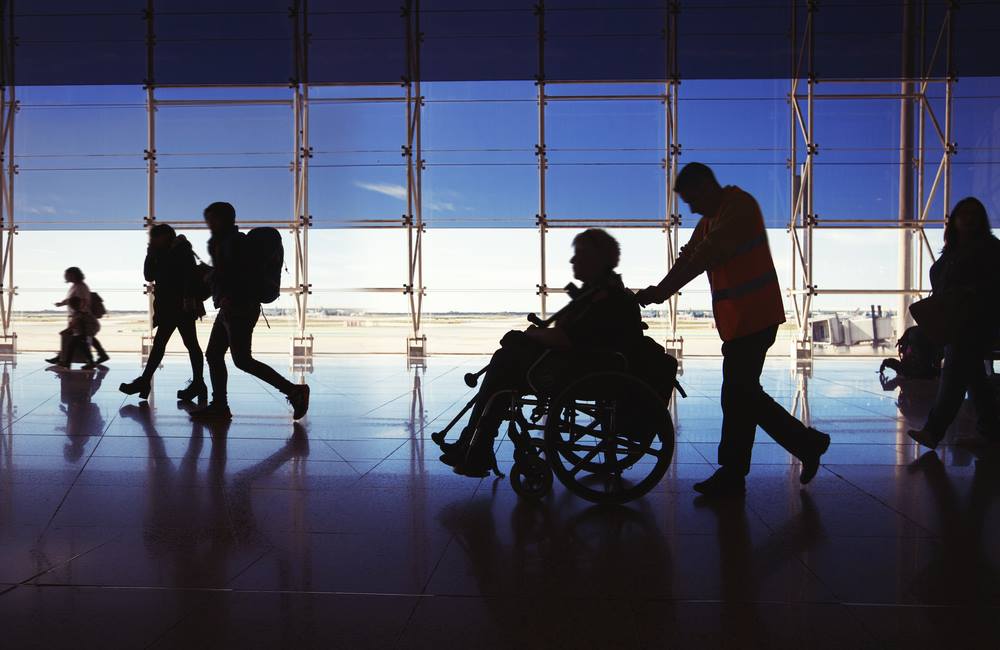
by Flying Angels Editorial Team | News & Resources
It’s easy to get terms confused when it comes to understanding different jobs in the nursing profession. Two of the jobs often mistaken for one another – or used interchangeably – are flight nurse and travel nurse.
However, there are big differences. A flight nurse specializes in providing medical care for patients during a flight. A travel nurses goes to different hospitals, helping provide care to patients.
Here’s a more detailed look at the two jobs.
What a Travel Nurse Does
Travel nurses sign up for the job of moving around to work at hospitals in different areas, helping the team at each facility provide care for patients.
In many cases, travel nurses are needed because a hospital is facing a nursing staff shortage. In the past, this often meant hospitals in rural areas. However, with the fast growth of the healthcare industry in recent years, nursing shortages now exist in places all around the country.
Travel nurses are not trained to work on an aircraft. They also may not have the emergency medical services training that a flight nurse has. Depending on the job requirements, some travel nurses may be LPNs or allied health professionals.
The assignments for travel nurses vary in length. In most cases, their temporary stint at a hospital will last anywhere from one month to as long as a year.
What a Flight Nurse Does
A flight nurse, such as those who work with Flying Angels, are highly trained nurses with experience in emergency care.
Flight nurses have extensive training in handling medical emergencies while in an aircraft. They are all registered nurses, and in many cases have advanced degrees. In the case of Flying Angels, nurses also have extensive emergency room experience.
This training and experience is needed to provide quality care for patients who are flying. In addition to having the ability to handle medical emergencies if they should arise, flight nurses also continually checking a patient’s condition and understand the patient’s needs in terms of medication and tolerance for air travel.
They also may consult with a patient’s physician to get a thorough understanding of a patient’s medical conditions, procedures they may have under gone and any medication needs they have during the flight.
In short, flight nurses are highly specialized medical professionals with the training and experience needed to handle a very specific situation: a patient traveling on an aircraft. Travel nurses have varying degrees of training and experience and work temporarily in hospitals to ensure quality care standards are maintained even if the hospital is short staffed.
While both involve professional nurses, they are very different jobs.

by Flying Angels Editorial Team | News & Resources
One of the key components of non-emergency medical transport (NEMT) is the presence of a flight nurse who travels with clients as they navigate through the airport and eventually take their flight.
For those interested in NEMT, it’s illuminating to know everything they do for patients.
Flight nurses have a challenging job. Transporting a patient via flight, 35,000 feet in the air with no one to call for help, is a huge responsibility. But flight nurses do an excellent job with this critical task. They combine the expertise of a medical professional with diplomatic skills and experience in travel to make the experience safe and even enjoyable.
Situations That Require NEMT
Why You Want A Flight Nurse
Flight nurses are trained to handle medical emergencies while traveling. They also handle dispensing any medication that is needed and put in the effort to make sure a client travels as comfortably as possible.
As in the case with Flying Angels, the best NEMT companies employ flight nurses who are registered nurses who have graduated from accredited nursing programs and obtained their RN license. They also have experience in critical care and emergency medical situations and are trained in flight physiology.
During a time when you might feel vulnerable as you make a long trip on a commercial airline, flight nurses provide the comfort level and expert care that gives you the confidence you need for your trip.
Are You Too Sick to Travel?
What Flight Nurses Do
Flight nurses have a variety of important duties. They include the following.
Packing a medical kit. Flight nurses carry the medical equipment needed to handle an emergency, as well as any medication a client needs.
Meeting all time schedules. Flight nurses, working with flight coordinators (who also are registered nurses), plan the trip and then manage it to meet all the scheduled airport arrivals and flight times.
Arranging ground transportation. This includes getting clients to the airport of departure and securing transportation once they arrive.
Working with international medical services. Flight nurses also coordinate any services needed overseas on international flights. This can include overcoming language barriers and understanding how medical services work in other countries.
Understanding airline rules. Flight nurses must know how different airlines handle different situations – both in the United States and overseas – and plan and act accordingly.
Understand flight physiology. Flight nurses have training in the specialty of flight physiology, as well as psychological stresses that sometimes affect clients during air travel.
What is Aviation Physiology?
Safety First
Commercial airlines were not designed for medical transport, but instead are a public transportation service. Part of understanding the different rules of airlines surrounding NEMT is knowing how to get the proper equipment when needed, such as stretchers and wheelchairs.
All of this is part of a flight nurse’s focus on safety. That’s the first job of a flight nurse: providing care to ensure a client’s health and safety during their flight. Understanding what equipment to bring and how to coordinate with various airlines, both foreign and domestic, is part of the expertise a flight nurse contributes.
Flight nurses play the most important role in NEMT. With the proper training and years of experience in intensive care, flight nurses provide clients with the safety and comfort they need as they make their journey.
How Does a Flight Coordinator Help?

by Flying Angels Editorial Team | News & Resources
The nursing profession offers excellent job opportunities for those committed to a career focused on helping others. Becoming a flight nurse is among those options. It’s one that is in more demand than ever.
What Exactly Does A Flight Nurse Do?
Flight nurses are often associated with emergency transportation, keeping patients stable while they are flown from the scene of an accident or disaster to the trauma unit of a local hospital.
However, flight nurses also work for companies such as Flying Angels, giving patients the medical support, they need while getting non-emergency medical transport.
It’s a challenging and rewarding job in the nursing profession. Becoming one requires dedication and commitment to the nursing profession and a nurse’s goal of providing quality care for others.
Education Needed For A Flight Nurse
The recommendation for a flight nurse is a Bachelor of Science in Nursing degree. Four-year degree programs in nursing typically include coursework in physical and social sciences, critical thinking, communication and leadership. Bachelor’s degree programs in nursing also offer clinical experience.
Those that wish to take on leadership positions in the medical field may also earn a Master of Science degree in nursing. All nurses in every state – as well as the District of Columbia and U.S. territories – must also earn a license to practice as a nurse.
All this prepares you to become a registered nurse. Becoming a flight nurse takes further experience.
Experience
NEMT companies typically only consider applicants for flight nurse jobs from those with at least three years of experience as a nurse in an intensive care unit (ICU) or emergency room. Some have an even higher standards.
For example, Flying Angels usually looks for nurses with about five years of experience, according to Bob Bacheler, managing director at Flying Angels.
He said the ICU experience sharpens critical thinking skills and gives nurses exposure to very ill patients. Time working in an emergency room gives nurses experience in dealing with a high volume of patients, trauma cases, making good assessments and improving triage and physical skills.
Bacheler said whatever unit a nurse has experience in “you would want it to have the highest possible acuity and exposure to different patients.”
Certifications And Further Education
Those who want to become flight nurses can demonstrate their commitment to the career by earning a Certified Flight Registered Nurse (CFRN) designation from the Board of Certification for Emergency Nursing (BCEN).
Employers also look with favor on those who have earned a Critical Care Registered Nurse (CCRN) certification offered through the American Association of Critical Care Nurses.
Other coursework also should be taken. Bacheler, who has both a CFRN and CCRN, also is one of the authors of the coursework for the Trauma Practitioner Advanced Trauma Course. Required courses include Basic Life Support (BLS) and Advanced Cardiovascular Life Support (ACLS). Pediatric Advanced Life Support (PALS) is also available for those who plan to work with children.
Bacheler also serves as a board member for the Air & Surface Transport Nurses Association, which also offers guidance on becoming a flight nurse.

by Dan McCormick
Flight Nursing: Exploring a Sky-High Job for the Adventurous NurseNovember 8, 2021 It’s no secret the nursing profession is home to a wide variety of specialized roles. Whether they’re working in the operating room, emergency room, intensive care unit or at a...

by Dan McCormick
Attracting More Minority Nurses to Flight NursingAug 3, 2020 Flight/Transport nurses travel throughout the country and even throughout the world. An issue in the field, though, is that not many minorities are choosing this line of work. So, how can we attract more...





